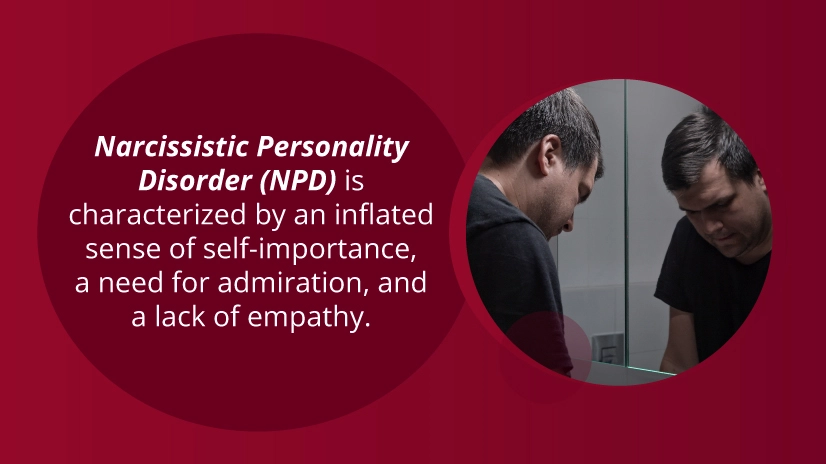
Understanding Narcissistic Personality Disorder (NPD)
Clinically Reviewed by:
Narcissistic personality disorder (NPD) is a condition where a person has an inflated sense of their own importance and a strong need for admiration. People with NPD often lack empathy for others and may struggle with relationships because of their self-centered behavior.
While it’s normal for everyone to have some level of self-esteem, those with NPD take it to an extreme. In this article, we will delve into the signs, causes, and treatment options for those dealing with narcissism, aiming to bring awareness to this often misunderstood disorder.
Key Takeaways
Understanding narcissistic personality disorder (NPD) is the first step in realizing how it affects both the individual and those around them. Here is what you need to know:
- NPD can result from a combination of genetic influences, psychological factors, and environmental experiences.
- The DSM-5 criteria for diagnosis are that there must be at least five symptoms and significant distress or impairment in daily life.
- NPD can damage both personal and professional relationships due to the narcissist’s lack of empathy and manipulative behavior.
- Effective management includes psychotherapy, medicines, and self-help strategies tailored to the individual’s needs.
- Setting boundaries, practicing effective communication, and seeking support are vital when dealing with someone with NPD.
Indiana Center for Recovery provides specialized care for people with medical conditions like NPD. For more information about our services, call us at (844) 650-0064.

Symptoms And Characteristics
Narcissistic personality disorder (NPD) involves patterns of behaviors that often disrupt relationships and affect an individual’s daily life. Here are the key symptoms and characteristics that help identify this disorder.
Grandiosity And Self-Importance
People with NPD often have an inflated sense of their own worth and believe they are superior to others. They may exaggerate their achievements or talents and expect special treatment. This sense of grandiosity can lead them to dismiss others’ opinions and needs, focusing only on themselves.
Need For Excessive Admiration
Those with NPD crave constant attention and admiration. They may fish for compliments or act in ways that demand praise from others. This need for excessive admiration is often tied to their fragile self-esteem, and they feel distressed when they don’t receive the admiration they believe they deserve.
Sense Of Entitlement
A strong sense of entitlement is a core feature of NPD. People with this disorder may believe they are owed certain privileges, resources, or recognition without putting in effort. This sense of entitlement often leads them to make unreasonable demands or become angry when things don’t go their way.
Lack Of Empathy
Individuals with narcissistic traits often struggle to understand or care about the feelings of others. They may not recognize when someone is upset or hurting, which makes forming healthy relationships difficult. Their lack of empathy can lead to behaviors that seem cold or insensitive to others.
Exploitative Behavior
Individuals with NPD might use others to achieve their own goals without considering the consequences for those around them. They may manipulate, deceive, or take advantage of people, viewing relationships as opportunities to gain something rather than to connect on a deeper level.
Causes And Risk Factors
Narcissistic personality disorder (NPD) doesn’t develop overnight. Various factors contribute to its onset, ranging from genetics to life experiences. Here are the key causes and risk factors linked to NPD.
Genetic Influences
Researchers suggest that genetics may play a part in developing narcissistic characteristics. People with a family history of narcissism or other personality disorders are at a higher risk. Certain genetic traits may make individuals more prone to self-centered behavior or seeking admiration. However, genetic factors alone are not enough to cause NPD, and other elements contribute as well.
Psychological Components
Psychological factors, such as early childhood experiences, can contribute to NPD. Children who receive excessive praise or, conversely, neglect may develop an inflated sense of self-importance. Trauma, such as emotional abuse or harsh criticism, may also affect the development of narcissistic personality traits. These early experiences shape their self-image and relationships with others later in life.
Environmental Factors
Environmental influences like cultural expectations, social situations, and family dynamics also play a part in developing NPD. Growing up in an environment that values appearance, high status, or success over emotional well-being can foster narcissistic tendencies. Similarly, societal pressures, such as those promoting individualism or competitiveness, may encourage a person to adopt behaviors linked to narcissism.
Diagnosis Of Narcissistic Personality Disorder (NPD)
The diagnosis of narcissistic personality disorder (NPD) involves careful evaluation by a qualified mental health professional, often using DSM-5 criteria and different techniques.
DSM-5 Criteria
According to the DSM-5 (Diagnostic and Statistical Manual of Mental Disorders, 5th Edition), NPD is diagnosed when specific patterns of behavior are present. These patterns usually begin in late adolescence or early adulthood.
A diagnosis requires meeting at least five of the following symptoms:
- A grandiose sense of self-importance
- Preoccupation with fantasies of success or power
- Believing they are “special” and unique
- Requiring excessive admiration
- A strong sense of entitlement
- Being exploitative in relationships
- Lacking empathy
- Being frequently envious of others or believing others envy them
- Displaying arrogant or haughty behaviors
For a diagnosis to be made, these symptoms must be consistent over time and cause significant distress or impairment in an individual’s different areas of life.
Common Diagnostic Techniques
NPD is usually diagnosed through clinical interviews where mental health professionals ask about the person’s thoughts, feelings, and behavior patterns. Standardized questionnaires or self-reports can also help identify traits. In addition, family members or close friends might offer insight into the person’s behaviors and social interactions, which is crucial for a comprehensive assessment.
Challenges In Diagnosis
Diagnosing NPD can be difficult due to its overlapping symptoms with other mental health conditions, like borderline personality disorder (BPD), antisocial personality disorder (ASPD), histrionic personality disorder (HPD), or paranoid personality disorder (PPD). Many individuals with NPD may not seek help because they don’t believe they have a problem. Additionally, some people may hide or minimize their behaviors during evaluations, making it harder to diagnose accurately.
Impact On Relationships
Narcissistic personality disorder (NPD) affects not only the individual with the disorder but also the people around them. Here’s how NPD can impact both personal and professional relationships.
Personal Relationships
People with NPD struggle to maintain healthy personal relationships. Their excessive need for admiration, lack of empathy, and sense of entitlement can cause emotional harm to partners, family members, and friends. The narcissist may demand constant attention and validation, leaving little room for the feelings of others. This can result in frustration, misunderstandings, and conflict in close relationships.
Professional Relationships
In the workplace, NPD can lead to conflicts with coworkers, supervisors, and subordinates. Individuals with NPD may expect special treatment, undermine others, or take credit for others’ work. Their need to be admired can lead to tension in teams or workplaces, often resulting in poor collaboration. These behaviors can harm their career advancement and cause ongoing stress in their professional lives.
Treatment And Management
Managing narcissistic personality disorder (NPD) involves a combination of therapies, medications, and self-help strategies. These approaches can help reduce symptoms and improve overall well-being.
Psychotherapy Approaches
Psychotherapy, especially talk therapy, is the primary treatment for NPD. Cognitive behavioral therapy (CBT) and dialectical behavior therapy (DBT) are common types. These therapies help individuals understand their thoughts, feelings, and behaviors and work toward healthier ways of thinking and interacting with others. Therapy also addresses low self-esteem issues and teaches empathy, which can improve relationships.
Medication Options
While there are no specific medications for NPD, doctors may prescribe medications to treat symptoms linked to the disorder, such as depression, anxiety, or mood swings. Antidepressants, anti-anxiety medications, or mood stabilizers may help stabilize emotions. Medications are used in combination with psychotherapy to address the emotional and psychological aspects of the disorder more effectively.
Self-Help Strategies
Self-help strategies can also help manage NPD. For example, practicing mindfulness and self-reflection can help individuals develop greater empathy and awareness of how their behavior affects others. Setting realistic goals and seeking feedback from others can encourage personal growth. Joining support groups can also offer opportunities to connect with others facing similar challenges.
Coping With Someone With NPD
Dealing with someone who has narcissistic personality disorder (NPD) can be challenging, especially in close relationships. Learning how to cope is crucial for maintaining your own well-being.
Setting Boundaries
Setting clear and firm boundaries is vital when dealing with someone with NPD. It’s important to communicate what behavior is acceptable and what isn’t. People with NPD may test limits, so consistency is key. Boundaries protect your mental and emotional well-being and can help reduce manipulative or harmful behavior. Stay calm and assertive when enforcing these limits.
Effective Communication Strategies
Effective communication with someone who has narcissistic traits involves staying calm, clear, and assertive. Avoid arguing or getting defensive, as this can escalate the situation. Focus on expressing your own feelings without attacking them. Use “I” statements, such as “I feel upset when…” instead of “You always…”. This approach can help reduce conflict and foster better understanding.
Seeking Support
Dealing with someone with NPD can be emotionally draining, so it’s essential to seek support. Talk to trusted friends, family members, or a trained therapist to get advice and perspective. Support groups for people affected by NPD can provide understanding and shared experiences. Having a strong support system helps you manage stress levels and take care of your own mental health.
Frequently Asked Questions (FAQs)
What are the five main habits of a narcissist?
A narcissist typically exhibits five key habits:
- Constant Need For Admiration: They seek excessive praise and attention from others.
- Sense Of Entitlement: Narcissists believe they are special people and deserve superior treatment and admiration.
- Lack Of Empathy: They struggle to understand or care about others’ feelings.
- Exploitation Of Others: They often use people to get what they want without considering their needs.
- Arrogant Behavior: Narcissists tend to belittle others to boost their own self-esteem, often acting superior.
These habits contribute to unhealthy relationships and make it difficult for narcissists to connect with others on a meaningful level.
What does a narcissistic person act like?
A narcissistic person often behaves in ways that center around themselves. They act as if they are superior to others and expect admiration and praise. They may exaggerate their achievements and talents, seeking constant attention and approval. They often lack empathy, showing little concern for how others feel.
Narcissists might manipulate situations to their benefit, using others without guilt. When criticized, they may react defensively or dismissively. These individuals often have difficulty accepting responsibility and may blame others for their mistakes. Overall, their behavior can be self-centered, arrogant, and dismissive of the needs and feelings of others.
Step Into A New Beginning At Indiana Center For Recovery
Mental health challenges, including narcissistic personality disorder (NPD), can feel like an ongoing battle. But you’re not alone and don’t have to fight it alone. At Indiana Center for Recovery, we’ve got your back with expert care and proven strategies to help you take control.
Our inpatient psychiatric services are built for strength—offering individualized treatment that focuses on your needs. With individual therapy and group therapy sessions, our goal is to help you gain control over your emotions, behavior, and relationships. Medication management will help you stay on track while your mind clears, and our family programs ensure you’re never without support.
Plus, we understand that mental health problems can lead to drug abuse, and we offer dual diagnosis support to help you break free from that cycle.
Don’t let anything hold you back from the life you deserve. Call us now at (844) 650-0064 and start your recovery journey today.






 100% Confidential
100% Confidential